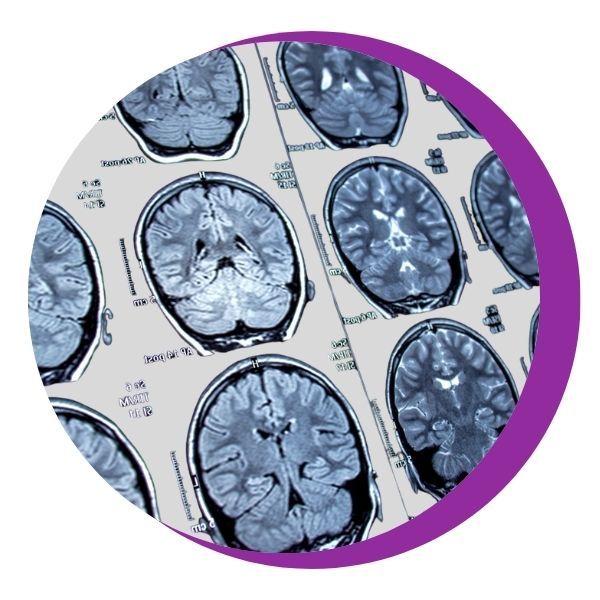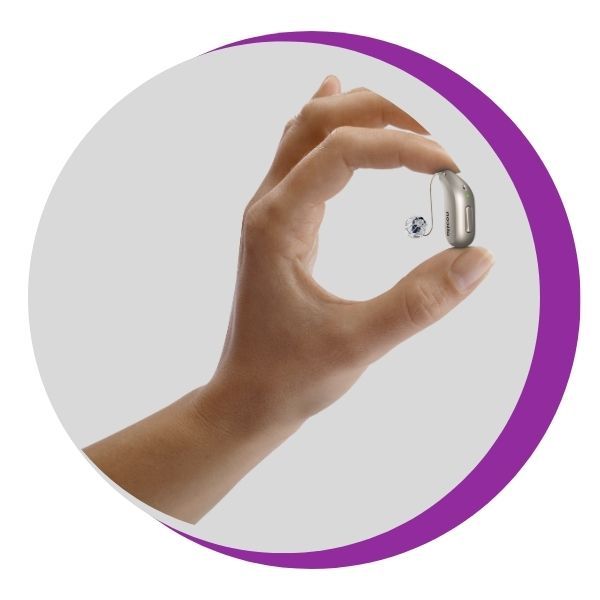Brain Health
& Hearing Loss
How does hearing loss rewire neural pathways?
What happens to the brain when hearing is improved through amplification or a cochlear implant?
Research reveals that hearing loss triggers neuroplasticity, rewiring neural pathways and changing the brain physically and functionally.
CAN MILD HEARING LOSS LEAD TO BRAIN CHANGES?
Yes. For decades, it has been well known and accepted that substantial hearing loss and deafness lead to dramatic changes in the brain's auditory cortex and other brain structures. But did you know that new research out of the University of Colorado Boulder's Brain and Behavior Laboratory has demonstrated that even mild sensorineural hearing loss (SNHL) leads to brain changes and cortical re-organization? The research also bears out that these changes begin quickly when SNHL becomes present rather than as a cumulative effect after years of worsening hearing.
WHAT COMPENSATORY MECHANISMS DOES THE BRAIN EMPLOY BECAUSE OF HEARING LOSS?
The human brain is accustomed to and wired for receiving a full range of environmental sounds with speech being one of the most complex and structured that the human brain interprets. Thus, when an auditory task that was once effortless—like listening to a conversation in a busy restaurant—becomes challenging due to hearing loss, the brain compensates by seeking to accomplish the same goal by way of vision. Researchers have found that the brain physically changes when this recruitment of vision happens, with the higher order areas of the auditory cortex showing functional changes when recruited by vision. Using electroencephalography (EEG) on people with hearing loss, researchers stimulate the brain using only visual input and observe that areas of the brain that responded to auditory input before hearing loss have reorganized to respond to visual stimuli.

WHAT IS HAPPENING IN THE FRONTAL AND PRE-FRONTAL AREAS OF THE BRAIN?
Using electroencephalography (EEG), researchers have noted increased activity in the frontal and pre-fontal areas in the brain in those with even mild hearing loss. This re-allocation of cortical resources from the auditory areas to the frontal cognitive areas suggests that the brain is expending more effort to listen. This increase in cognitive load can lead to listening fatigue, may be a factor in cognitive decline, and can put a person at higher risk for mental health issues like anxiety and depression.

CAN IMPROVING HEARING WITH HEARING AIDS AND COCHLEAR IMPLANTS HELP THE BRAIN?
Yes! Long-term research is still being gathered to paint the full picture on the benefits of hearing technology—like hearing aids and cochlear implants—as it applies to decreased brain recruitment and reorganization, but initial research points in that direction. Some case studies reveal that people wearing hearing aids appear to show a reversal in brain recruitment and reallocation. Further, the brain of a person who has been treated for hearing loss sooner rather than later experiences fewer changes in cortical resource allocation. Also, that person is more likely to retain better speech perception as compared to a person whose brain has "forgotten" how to hear as a result of long-term untreated hearing loss.

WHAT IS ON THE HORIZON FOR A COGNITIVE COMPONENT TO AUDIOLOGIC TESTING?
Within the audiologic profession, there is a movement that is gaining momentum to fold basic cognitive function screening into hearing testing. Since cognitive issues often present similarly to listening disorders, it makes sense that in coming years audiologists will include a full battery of cognitive assessments to bring greater insight and understanding to a person's overall cognitive health, even when looking at a specific condition like hearing loss. In fact companies are already developing assessment tools that measure reaction time to demonstrate how quickly the brain coordinates between stimulus and response. As science continues to connect the dots of hearing disorders and brain health, hearing care is certain to emerge as a vital tool in improving patients' overall health and wellness, especially since early detection of hearing loss and cognitive impairment is important because hearing loss in mid-life is a risk factor for dementia.

HOW ARE TINNITUS AND THE BRAIN CONNECTED?
Tinnitus, or ringing in the ears, can manifest from a variety of factors. While tinnitus may have similar characteristics from person to person, each individual's experience with tinnitus can be different in terms of severity, manifestation, and a person's ability to cope with the condition. As much as 90 percent of tinnitus cases can be traced to hearing loss, and even mild hearing loss can lead to tinnitus. Researchers now know that, physiologically, tinnitus occurs in the dorsal cochlear nucleus (DCN). The DCN is the interaction site of auditory and somatosensory system inputs. According to the stochastic resonance theory, hearing loss increases the neural activity of the somatosensory system in the DCN and causes tinnitus. In essence, the brain detects hearing loss in certain frequencies and fills in the silence with ringing. Tinnitus flare ups can also be triggered or exacerbated by things like stress, ototoxic medications, smoking, alcohol consumption, and more. The best place to start in seeking a tinnitus management plan is with a doctor of audiology, who can test to determine exactly what frequencies of hearing have experienced damage leading to hearing loss and, thus, tinnitus. While tinnitus is not currently curable, toning it down is possible and is often best accomplished using a multi-disciplinary team approach with care providers from various specialties playing a role. For those whose tinnitus impacts daily mental health and function, managing the condition can have significant positive benefits for a person's well-being and quality of life.
Healthy hearing is achievable these days with hearing aids that are sleek, sophisticated, advanced, and inconspicuous. A far cry from the clunky, imprecise amplifiers of yesteryear. These modern marvels of technology coupled with the skill and expertise of a doctor of audiology can be life changing for those with hearing loss.
Here's what people have to gain from taking control of their hearing health.
A proactive step for keeping the brain active and engaged as a person ages
Connection with co-workers, friends, and family
Better understanding and clearer communication with healthcare providers
Greater potential for job advancement
The opportunity to join the thousands of happy patients Johnson Audiology has helped regain a better quality of life.
Medical professionals, contact
Johnson Audiology today!
Contact Us
Thank you for contacting us at Johnson Audiology.
We will get back to you as soon as possible.
Please try again later.
Call today!
(678) 820-3843 - Cartersville office
(423) 556-7202 - Chattanooga office
(615) 882-1055 - Franklin office
(423) 556-3554 - Hixson office
(615) 640-3683 - Murfreesboro office
or use the form above to contact us.
Five locations to serve patients better
105 West Main Street
Cartersville, GA 30120
Office Hours:
Monday: 8.00am – 5.30pm
Tuesday: 8.00am – 5:30pm
Wednesday: 8.00am – 5.30pm
Thursday: 8.00am – 5.30pm
Friday: Closed
6830 Lee Highway
Chattanooga, TN 37421
Office Hours:
Monday: 8.00am – 5.30pm
Tuesday: 8.00am – 5:30pm
Wednesday: 8.00am – 5.30pm
Thursday: 8.00am – 5.30pm
Friday: Closed
3325 Aspen Grove Dr., Ste. 105
Franklin, TN 37067
(615) 640-3783
Office Hours:
Monday: 8.00am – 5.30pm
Tuesday: 8.00am – 5:30pm
Wednesday: 8.00am – 5.30pm
Thursday: 8.00am – 5.30pm
Friday: Closed
5617 Highway 153, Ste. 203
Hixson, TN 37343
Office Hours:
Monday: 8.00am – 5.30pm
Tuesday: 8.00am – 5:30pm
Wednesday: 8.00am – 5.30pm
Thursday: 8.00am – 5.30pm
Friday: Closed
804 North Thompson Lane, Suite 1F Murfreesboro, TN 37067
Office Hours:
Monday: 8.00am – 5.30pm
Tuesday: 8.00am – 5:30pm
Wednesday: 8.00am – 5.30pm
Thursday: 8.00am – 5.30pm
Friday: Closed
*This link leads to the machine-readable files that are made available in response to the federal Transparency in Coverage Rule and includes negotiated service rates and out-of-network allowed amounts between health plans and healthcare providers. The machine readable files are formatted to allow researchers, regulators, and application developers to more easily access and analyze data.
All Rights Reserved | Johnson Audiology | Powered by Flypaper | Privacy Policy





